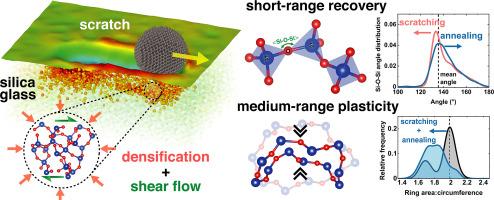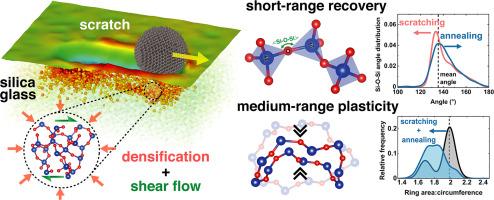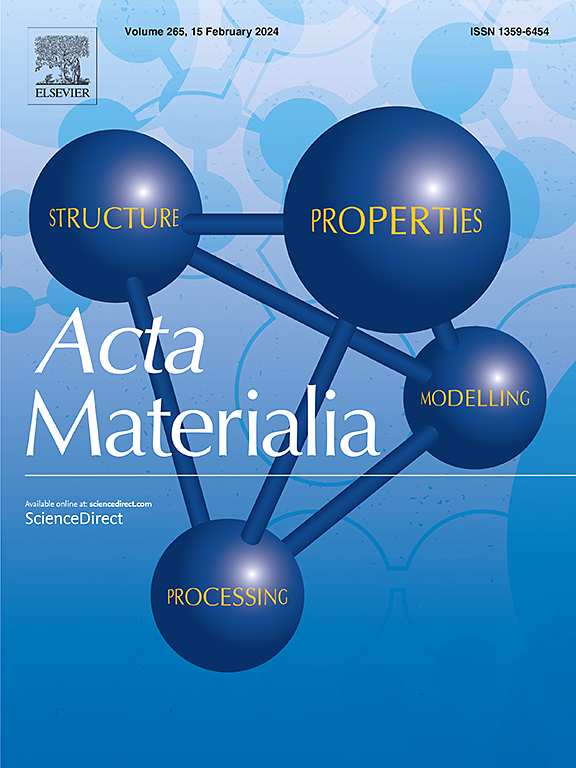Atomistic insights into scratch-induced structural evolution of silica glass
IF 8.3
1区 材料科学
Q1 MATERIALS SCIENCE, MULTIDISCIPLINARY
引用次数: 0
Abstract
Understanding the mechanism of scratch damage is vital to developing better scratch-resistant glasses. To this extent, employing molecular dynamics simulations and experiments, we investigate the scratch damage of silica glass against a rigid diamond indenter. The glass surface is pre-indented to a constant depth and then dragged to simulate a linear scratch, and the structural impact in the indent-to-scratch transitioning phase is examined. We observe that despite the differences in length and timescales, the simulated values of indentation hardness and coefficient of friction exhibit excellent agreement with experimental values from nanoindentation and atomic force microscopy experiments. Interestingly, analysis of the subsurface deformation in the scratched region reveals densification and shear flow, in contrast to pure densification, as in the case of indentation. Furthermore, similar percentages of recovery from experiments and simulation reveal that the reversible component of plastic deformation owing to densification is comparable in both cases. Finally, in contrast to the common hypothesis, we demonstrate that while the bond angles and lengths recover significantly, the ring structure does not recover upon annealing, although they exhibit some relaxation. Thus, the present study sheds new light on the crucial role of the medium-range structure of glasses subjected to scratch deformation.


划痕诱发硅玻璃结构演变的原子论见解
了解划痕损伤的机理对于开发更好的抗划痕玻璃至关重要。为此,我们利用分子动力学模拟和实验,研究了硅玻璃对刚性金刚石压头的划痕损伤。先将玻璃表面压入一个恒定的深度,然后拖动以模拟线性划痕,并研究压入到划痕过渡阶段的结构影响。我们观察到,尽管长度和时间尺度不同,但压痕硬度和摩擦系数的模拟值与纳米压痕和原子力显微镜实验的实验值非常一致。有趣的是,对划痕区域表层下变形的分析显示了致密化和剪切流,而不是像压痕那样的纯致密化。此外,实验和模拟的恢复百分比相似,这表明两种情况下由于致密化而产生的塑性变形的可逆成分相当。最后,与常见的假设相反,我们证明了在退火时,虽然键角恢复了,但环状结构并没有恢复,尽管它们表现出一些松弛。因此,本研究揭示了玻璃在划痕变形过程中的中程结构所起的关键作用。
本文章由计算机程序翻译,如有差异,请以英文原文为准。
求助全文
约1分钟内获得全文
求助全文
来源期刊

Acta Materialia
工程技术-材料科学:综合
CiteScore
16.10
自引率
8.50%
发文量
801
审稿时长
53 days
期刊介绍:
Acta Materialia serves as a platform for publishing full-length, original papers and commissioned overviews that contribute to a profound understanding of the correlation between the processing, structure, and properties of inorganic materials. The journal seeks papers with high impact potential or those that significantly propel the field forward. The scope includes the atomic and molecular arrangements, chemical and electronic structures, and microstructure of materials, focusing on their mechanical or functional behavior across all length scales, including nanostructures.
 求助内容:
求助内容: 应助结果提醒方式:
应助结果提醒方式:


